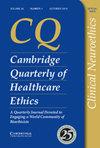痴呆症患者是如何遭受痛苦的?
IF 2.3
4区 医学
Q3 HEALTH CARE SCIENCES & SERVICES
引用次数: 0
摘要
这篇文章认为,痴呆症患者的痛苦不仅仅是个人经历的问题。这是别人知道的,不需要依靠病人的报告来确认它。甚至有可能一个人声称自己没有痛苦——“我过得很好”——但其他人却得出相反的结论——“你在痛苦”。这种客观描述的一个关键属性是照顾者观察痛苦。这一观察结果是护理工作的产物,而这项工作依赖于对痴呆症患者思想的感知和支持。当这种精神支持工作成功时,它会创造一种宾至如归的感觉。如果不是这样,痛苦就会随之而来。本文章由计算机程序翻译,如有差异,请以英文原文为准。
How do Persons With Dementia Suffer?
This essay argues that suffering in persons with dementia is more than a matter of personal experience. It is knowable by others and does not need to rely on the reports of the patient to affirm it. It is even possible for a person to claim not to be suffering-"I'm doing fine"-but for others to conclude to the contrary-"You are suffering." A key property of this objective account is the caregiver observes the suffering. This observation is a product of the work of caregiving and this work relies on perceiving and supporting the mind of the person living with dementia. When that work of mind support is successful, it creates a feeling of being at home. When it is not, suffering ensues.
求助全文
通过发布文献求助,成功后即可免费获取论文全文。
去求助
来源期刊
CiteScore
2.90
自引率
11.10%
发文量
127
审稿时长
>12 weeks
期刊介绍:
The Cambridge Quarterly of Healthcare Ethics is designed to address the challenges of biology, medicine and healthcare and to meet the needs of professionals serving on healthcare ethics committees in hospitals, nursing homes, hospices and rehabilitation centres. The aim of the journal is to serve as the international forum for the wide range of serious and urgent issues faced by members of healthcare ethics committees, physicians, nurses, social workers, clergy, lawyers and community representatives.

 求助内容:
求助内容: 应助结果提醒方式:
应助结果提醒方式:


